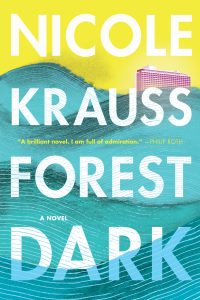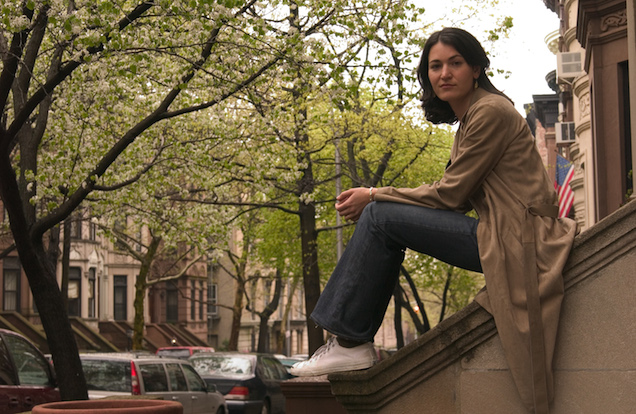 The characters in Forest Dark are neither “empathetic people from the first page,” as they were in The History of Love, nor are they quite those “who, from the first, were difficult people, as people are,” such as populated her Great House. They defy easy categorization while tempting you to draw connections between their own journeys through parts unknown with what you might think you know of Krauss. They include the elderly Jules Epstein, a wealthy and formerly gregarious New York attorney who has begun selling off his considerable possessions. On page one we learn he has disappeared from the rundown Tel Aviv apartment in which he had been living alone. And we have the protagonist of a parallel story that, in true Krauss fashion, is recounted in alternating chapters, a novelist living in Brooklyn with two sons, and a husband from whom she feels increasingly distanced. Ostensibly to research a new book, she, too, leaves for Tel Aviv. Her name is Nicole.
The characters in Forest Dark are neither “empathetic people from the first page,” as they were in The History of Love, nor are they quite those “who, from the first, were difficult people, as people are,” such as populated her Great House. They defy easy categorization while tempting you to draw connections between their own journeys through parts unknown with what you might think you know of Krauss. They include the elderly Jules Epstein, a wealthy and formerly gregarious New York attorney who has begun selling off his considerable possessions. On page one we learn he has disappeared from the rundown Tel Aviv apartment in which he had been living alone. And we have the protagonist of a parallel story that, in true Krauss fashion, is recounted in alternating chapters, a novelist living in Brooklyn with two sons, and a husband from whom she feels increasingly distanced. Ostensibly to research a new book, she, too, leaves for Tel Aviv. Her name is Nicole.
When asked just how autobiographical are those sections that feature a character who is a Brooklyn writer named Nicole? “Oh, I mean of course, it’s usually the first question people ask me,” the “real” Nicole says in response. The similarities between creator and creation are many: They share a name, a home, two sons, one religion, a friend named Matti Friedman (a journalist in real life, as he is in the story), and a failing or failed marriage (Krauss divorced from author Jonathan Safran Foer several years ago), among other details.
“I totally get it,” Krauss says of the desire to ascertain what is true and what is invention. “But my hope is [the book is] also tempting you to sit with the question of, why does it matter so much to us? It matters to me, too,” she’s quick to add. “I’m fascinated by where the supposedly real ends and the imagining begins.”
But a concrete answer she will not offer. Instead, and without referring to the novel specifically, she makes like Forest Dark — a book that traffics more overtly in abstract ideas through its discussions and inner monologues than its predecessors — and cites a larger concept. “When you write, for example, in the
first-person voice of an old man, like in The History of Love with [the character] Leo Gursky . . . if you’ve had the experience of sitting down and trying to write an old man, you would know that you’re going to draw from your own experience, and naturally you can only make him out of some aspect of you. Part of it is your observations of old men, but much of it, like the really deep value of it, is you. So once you understand, like, oh, I also contain an old man . . . you understand what is called ‘the self’ is largely something that is a construction and it’s an ongoing creative act.”
She continues, “I was aware when I was writing this that this would be a question that would be tripped, and I hope it asks a larger question.”
Large questions make for the foundations and furniture of all great fiction. Forest Dark explores what happens when two people reject their previous understandings of reality and begin to embrace the uncertain. For Epstein, this means engaging with Jewish mysticism and poetry; for the Nicole character, it means, among other things, acting with an uncharacteristic lack of planning. (“I didn’t want to see things as they were. I had grown tired of that,” the character says.)
The work of the Jewish scholar Abraham Joshua Heschel became important to Krauss as she was thinking through the book. In his Man is Not Alone, Heschel discusses “turning away from wonder, and what is lost when we live in a society that doesn’t value wonder, is almost afraid of wonder,” says Krauss. It was this line of thought that “woke up or fed” the questions she was forming: “why is it that we have made such a religion out of factual, rational knowledge, and in what ways is it good for us, and in what ways does it make us feel a little bit ill, and what do we lose when we can only think of the unknown or uncertainty with anxiety?”
Among the more mystical elements addressed within the narrative is Heschel’s idea of menucha, or, simply put, peace. Alongside this theory stand several others that allude to universal feelings, universal sensations, universal doubts and hopes, but which are described in terms of the characters’ engagement with religious texts and called by their Hebrew names: Tzimtzum, Tikkun Olam and Tikkun ha’nefesh, Gilgul. (With them, too, is the not particularly Jewish concept of the unheimlich, or uncanny, which was, however, first posited by the Jewish Freud.) These concepts so fundamental to the discursive book and its human evocations are rooted in a specific culture, as are the protagonists and the people whom they meet.
Krauss, who was named to Vanity Fair’s 2009 list of young Jewish authors the magazine deemed the “New Yiddishists,” recalls an event she once attended while a student in the mid ‘90s. The Polish film director Krzysztof Kieslowski “was talking about how he no longer was interested in making films anymore because under Communism there was a secret language, and a gesture could be made among his films that all his audience would
know what he was talking about,” says Krauss. “So what I would say about that is, in terms of being Jewish, there’s something really, really wonderful and profound to feel, on the one hand, that maybe you have a deep, deep language with a people.” However, although this connection is “rich,” when it comes to her readers, “I don’t feel like I’m thinking about Jews in the way that Kieslowski was thinking about only those people” among his viewers who could decipher his code. Krauss insists she’s “not here to serve any party line” nor to speak “for anyone except myself.”
“So I guess those feelings are in conflict with each other: one is gratitude to have that richness of cultural belonging and language, and the other one is an absolute instinct, the freedom often not to write about it.”
And yet there’s no denying both the richness and ambivalence associated with her heritage are things she is able to mine for emotional effect. Take, for instance, Forest Dark’s Israel, the country to which the novel’s two American protagonists flee. Krauss says she has always felt at home there. “I feel at home here, too, but it’s surprising to feel at home in a place where you didn’t grow up.” In thinking about why “some aspect of it feels native to me,” she muses: “is it some aspect of the Jewish upbringing that always teaches you about here and there, where there’s always a there to your here? . . . What is it to grow up in a culture that somehow at its core teaches you that you are from someplace else, and no matter how well you’ve assimilated or roots you’ve put down, that other place, that there, whether you’ve touched it or kissed it or not, will always draw you — is that true, you know?”
This notion of a “there to your here” recurs throughout the book, and not only as an echo of Jewish thought. The first time we meet the Nicole character she is recounting a childhood memory of watching television and feeling so certain that a girl in the TV audience is her, that is, that she is both there on that television set, as well as where she is, in her parents’ bedroom. Yearning for a state of being different from how you are is, for Krauss, indelibly human. “Have you ever known a person who hasn’t grown incredibly tired of oneself and one’s life and one’s limitations and just wouldn’t love to be free of all the constraints, both self-imposed constraints, of which there are always far more than the constraints that people place on you,” and those that “the life you live force on you?” It’s no wonder that as Forest Dark explores the theme of transformation, the writer of The Metamorphosis, Franz Kafka, who also gives the work its epigraph, comes to play a prominent role.
Given the many themes, the many texts, the many ideas at play in Forest Dark, the novel may at first appear to stand apart from Man Walks Into a Room, The History of Love, and Great House as the most cerebral of the Krauss quartet. The narrative line is, perhaps, of less of a concern than ever it was. But though Krauss has sometimes been labeled “difficult,” cerebral is not how she would choose to describe her latest creation. Or, not only.
“I don’t know if it’s more cerebral. I mean, it feels emotional to me, but those things go hand in hand, cerebral and emotional.” Nor would she want to spoil the sense of the unknown that greets every reader at the onset of a new story by offering a neat summary of her Forest Dark. “In an ideal world, I would see that people are OK with the fact that it can’t be described . . . I would love it if it were OK to just say, here’s how the book made me think or feel, but I can’t really give you a synopsis of what it is, or what it’s about. You have to read it.”

